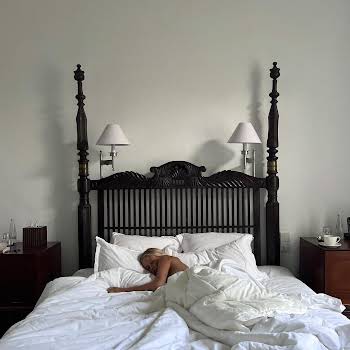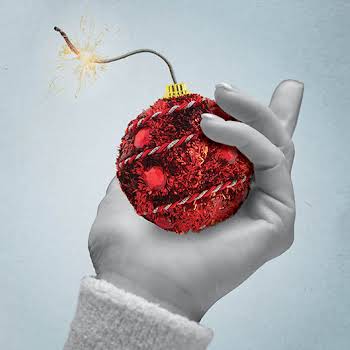
By IMAGE
14th Oct 2020
14th Oct 2020
Understanding how coronavirus anxiety works can help you manage it, writes psychotherapist Aoife Drury
The last few months have been chaotic, overwhelming and worrying. It’s utterly understandable to be stressed, especially if you are someone who may already be predisposed to feelings of anxiety, fall into the vulnerable category or are worried about your work.
It’s perfectly normal to feel nervous during this unprecedented time. Feeling overwhelmed can be debilitating. Please know you are not alone. This is hopefully a simple guide to just gain an understanding as to what might be happening for you and how you can manage it.
I tried to make it as light as possible (apart from the ol’ neuroscience thrown in. Nerd alert). Also, apologies for my lame jokes and grammatical errors, I’m no writer.
This first part can be skipped if you would prefer not to learn how anxiety is created. It helps some people and not others. You do what works for you.
How does anxiety work?
First things first (whenever I say that I think of the start of that Iggy Azalea song…) The more energy you give a thought, the stronger it gets and easier it is to access. A good way to think about it is as a Chinese Finger Trap — a little toy that you may have seen when you were small in trinket shops.
The more energy you use fighting the thought, the more power it holds
It’s a contraption you place your index fingers into. Spoiler alert here — the more you pull to try and release it, the stronger it gets! The trick is to push your fingers towards each other and out you pop. Just like the finger trap — the more energy you use fighting the thought, the more power it holds.
This would be great if it was positive reinforcement, but unfortunately our brain prefers and feeds off threats. This brings me onto cortisol, the stress hormone. We all experience stress from time to time. Sometimes it’s helpful (like to get us to hit a deadline) but too much can be damaging. Stress activates the fight/flight mode in the brain, which releases cortisol and adrenaline (the stress hormones) in our kidneys.
These hormones cause fatigue as it requires energy and effort meaning you feel more stressed, so it becomes a cycle. When our body gets flooded with these stress hormones, we feel drained: We worry, can’t sleep and become run down. All the things that bring our immune system down, which we don’t need when there is a circulating virus.
This is how the fight/flight/freeze (and fawn too, but that’s for another day) response works in the brain. For example, let’s say you’re leaving your house to go to work in the morning and you step out the front door and your pal Brian (play on words here. Get it!?) jumps out and shouts “BOO!” (the little brat).
Seeing and hearing Brian sends a message to your thalamus, which is like the Grand Central Station of your brain. It sends a memo to your amygdala, a primitive part of your brain (we needed it from our cave-people days) and the epicentre for strong emotional responses, e.g. fear.
The amygdala is super-fast and clever (it needs to be to protect us). The thalamus at the same time sends a message to the cortex, the part of the brain that deciphers what’s happening, rationally. The thing is that the amygdala is faster than the cortex. It needs to be so that the fight/flight response can be triggered when we are under attack.
Now when you realise it’s Brian, your cortex sends a message back to the amygdala telling it to calm down; it’s only that annoying man-child Brian, and hopefully you yell at him and walk away and can decompress.
But imagine Brian was instead a masked man with big biceps and a bat? That message from the amygdala and cortex to your hypothalmus sends a quick response to your pituitary gland which sends it to the kidney which releases adrenaline and cortisol. Which we learnt about earlier.
If this horrible man was spontaneously jumping out at random times, you’d be petrified to leave your house, which is fair. Our amygdala is pounding out alarms, set in fear mode, in a state of hyper-awareness. You see, the amygdala is not always that smart and reacts when there is no need, which is really annoying as it can take over and continue to ring the alarm.
Our awareness is heightened, on standby for potential threats. We begin to anticipate and create things out of a perceived threat
Bringing this into the virus, the fear we struggle with, coincided with the constant news alerts, anticipation of threat and overwhelming feelings of loss of control. Our amygdala is on over-drive. It’s like standing outside our door waiting for this masked stranger to jump out. Our awareness is heightened, on standby for potential threats. We begin to anticipate and create things out of a perceived threat.
Now that’s not to say that the virus is not a threat, not to mention the economic impact. BUT we need to recognise the difference between the need to fight/flight versus what we have control over. We need to bring the anxiety down and stop the amygdala from going off on one. Here’s how:
Communicate: This heightened anxiety may create strong negative emotional reactions; anger or frustration. When experiencing these emotions try and stay mindful of your responses. If you’re struggling with your anxiety and how you respond, the best thing you can do is communicate. Give yourself time or tell your loved ones you’re struggling and that you may react uncharacteristically.
Of course, this does not justify being cruel, rather helps ease the possibility of reacting in a way that you might regret and add to stress. There is a big difference between feeling emotions and acting on them.
Remove stressors: Continuously subjecting yourself to harmful situations function only to keep you in distress. Exposing and expressing a particular emotion can reinforce the emotion, allowing it to gain momentum and strength. Minimising access to the news, limiting communication with those who are generating fear, avoiding social media etc.
Make your brain your friend: Don’t deny your anxiety, acknowledge that it is there without fighting it. For example, try to say sentences that may help reassure: ‘This is my brain on high alert, trying to keep me safe, but I am safe and I’ll be just fine’. Try learning that your brain is trying to protect you, that you are not at odds. This to me can be so comforting. You see, your brain just wants to make sure that you’re okay, so it goes to high alert. It’s your home. Try not to be cruel to it.
Control the controllable: If you struggle with uncertainty, times like these can exasperate that feeling of being out of control. Pandemics and crises can not only increase mental health issues but develop underlying ones. The fear of believing you can do nothing to help yourself is debilitating, but it’s important to note that THOUGHTS ARE NOT FACTS. They are based on your previous experiences, biases and assumptions you live by.
During this time of uncertainty when even experts seem to be dazed, grasp at what you think you can control: YOU! The only thing you can control in your life is your behaviour. When you think about it, that can be very empowering, because you have CHOICE!
Here is a little exercise called APPLE:
A for AWARE – Notice the need for certainty.
P for PAUSE – Don’t react as you normally do. Just pause and breathe.
P for PULL BACK – Tell yourself this is the worry talking, and this need for uncertainty is not helpful.
L for LET GO – Let go of the thought or feeling about needing certainty. Tell yourself it is only a thought or feeling. Perhaps imagine it floating away on a cloud or bubble.
E for EXPLORE – You can explore the present moment, because right now, in this moment, we are ok.
Challenge your thoughts: If there is a persistent thought, try jotting it down, then think about an alternative way of looking at it. Is there another way I can think about this? In other words, give a perspective. This is a basic Cognitive Behavioural technique to reframe.
A fun (okay, probably not fun, but novel) way of doing this is to ‘put your thoughts on trial’. Imagine that there is a strong negative thought, get a piece of paper. Set up a defence on one side and prosecution on the other. Write down the evidence for both (which should be factually based), then at the bottom have The Judge and give a verdict on the evidence provided. Write that down too.
Remember, just because you think something, doesn’t make it true.
Create structure: The brain loves patterns and hates randomness, so give it some patterns to ease it by doing something that involves structure. Learn a dance routine, cook a recipe from scratch, learn a new skill (something like sign-language), www.coursera.org has loads of free courses online. Even writing out your day. Unfollow people who are scaremongering, and finally pick up a book, or watch some cute animal videos!
Move your body: It will help channel that adrenaline and get your body pumping. Try Joe Wicks’ free videos on YouTube, or a free yoga course. Many influencers have at-home workouts but that could lead you onto social media and that may not help!
Show yourself compassion: Validate how you are feeling. Acknowledge that this is hard. One of my favourite tools is finding where the anxiety is sitting. Chest? Stomach? Heart? Place your hands there and repeat: “This is pain”. “Pain is part of human life” (“others feel as I do”). “I can manage” (or an affirmation of your choice).
Practice mindfulness: Mindfulness has had major breakthroughs. It has displayed how we can increase the neuroplasticity of our brain (basically allows us to create new pathways in the brain). It’s about being present and aware of how you feel without it overbearing. Become aware of how you feel about the virus. Tell yourself how strong you are.
Download these apps: I like Budify and Calm and I know many people use Headspace too. Ferly is an app I work for — it is based on sexual wellness, but we are doing more work around general wellbeing too.
Look at the heroes: Showing gratitude is proven to affect our mood. When we hear great stories about people, we become what is called ‘morally elated’. It fills us with optimism and inspires us, warming our hearts. Can you find a silver-lining in this chaos? Is there anything you are grateful for? So, whether it’s showing gratitude to healthcare workers or looking at inspiring videos of Italy singing on balconies, these little moments can be very rewarding.
Photo: Pexels
Find out more about Aoife Drury here
Read more: Ask a therapist: ‘I’m worried that I might be the cause of my four-year-old son’s anxiety’
Read more: Why did I delete social media over the weekend? Because of the Coronavirus
Read more: High functioning anxiety: the signs, symptoms and when to seek help























